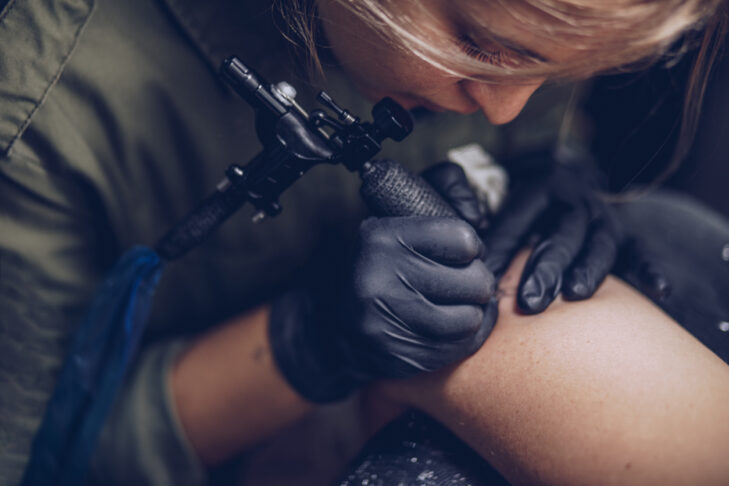On the morning of my first tattoo appointment, I prepared myself with a level of intensity and focus I had not previously attained. I showered, I exfoliated, I drank about a gallon of orange juice on the recommendation of one of the dozens of tattoo prep articles I had read. I arrived 15 minutes early, cash in hand, and lay for an hour while my artist meticulously jabbed me in the thigh approximately 300,000 times.
This was no spur-of-the-moment impulse decision. I had waited one calendar year for this tattoo, timing it directly after I had won a writing prize to minimize the risk of parental backlash. I wanted this tattoo—a monograph of the alphabet—desperately, and yet something rasped at the back of my mind. Was I breaking Jewish law?
I’d always thought of tattoos (save for cultural ones, of course) as taboo. The phrase “you wouldn’t put a bumper sticker on a Bentley” was thrown around a lot, and the general consensus among the adults in my life was that if you had a tattoo, you might as well resign yourself to a life of crime and loose women (not such a raw deal, in my 12-year-old opinion). But in the last 20 years, tattoos have become less about lifestyle and more about decoration and self-expression. After all, if the body is a temple, why not cover it in exquisite art?
Of course, the old myth of Jews and tattoos persists. “Will you still be able to be buried in a Jewish cemetery?” a friend asked after I was freshly inked. But while tattoos are still taboo in Orthodox and Conservative communities, Reform Judaism takes a slightly looser approach. For example, the rabbi of my childhood synagogue has full sleeves of tattoos.
However, it’s impossible to speak for all Jewish people, particularly on this topic, because of the forced tattooing during the Holocaust. Even if I wind up covered in ink, forearm tattoos still give me pause. And who could forget that hair-raising scandal when Elizabeth Warren’s former staffers tattooed the hex code for “Liberty Green” on their arms? Tattoos also carry immense taboos related to trafficking and crime in South Korea and Japan, to the point where some Japanese onsen (hot spring or bathing facility) will not allow someone access if they have tattoos. So, it’s incorrect to assume that tattoos are harmless, or that those who oppose them are incorrect in some way.
I believe the issue of whether or not to get a tattoo as a Jewish person comes down to consent and personal choice. Jewish law does not specifically forbid someone with tattoos from being buried in a Jewish cemetery, though individual burial sites can turn people away. The issues lies primarily in Leviticus, where markings and cuttings of the flesh are forbidden. Ultimately, as the cultural perspective of tattoos changes, I think we won’t see the last of them for a very long time. And, once it’s safe to do so, I’m sure I’ll find myself in the chair again.










